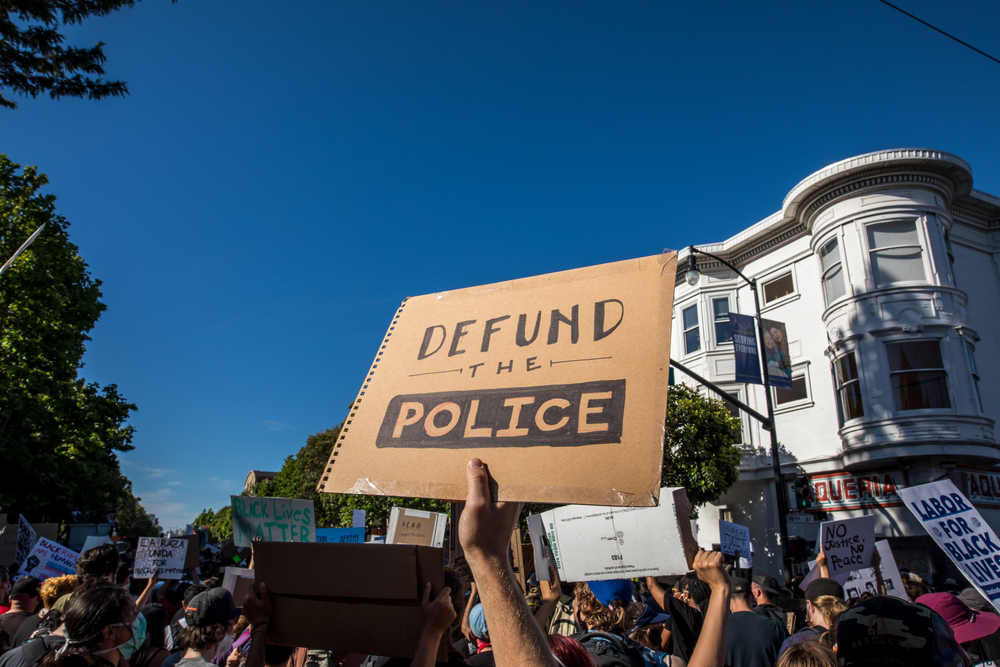Defund the Police, Invest in Communities
By
Guest Blogger
Posted:
|
Military & Security
By Ken Makin, originally published on Otherwords.

Five years ago, the U.S. Department of Justice’s Civil Rights Division released a damning report on the Ferguson, Missouri police department.
“Ferguson’s law enforcement practices are shaped by the city’s focus on revenue rather than by public safety needs,” the report summary concluded, “contributing to a pattern of unconstitutional policing” and practices that “both reflect and exacerbate existing racial bias” against African Americans.
The details were so devastating that they led to resignations from Ferguson’s police chief and city manager. Ferguson’s top court clerk and two officers who were found to have shared racist emails also resigned.
Ferguson was just one town, where the police killing of unarmed teenager Michael Brown led to some of the first mass “Black Lives Matter” demonstrations. But it showed a national problem: Police were aggressively initiating conflicts with residents to seek revenue for the city.
Now, in the wake of the murder of George Floyd and other black Americans by police, activists and experts across the country have a simple solution for the revenue problem and the police problem: Defund the police.
A few years ago, a collaboration between The Center for Popular Democracy, Law For Black Lives, and Black Youth Project 100 yielded a fascinating report into “reimagining safety and security in our communities.”
Entitled Freedom to Thrive, the report analyzed police spending in metropolitan cities. Most of those cities spent anywhere from 25 to over 40 percent of their general funds on policing, and far smaller sums on other social needs.
A different report from the Urban Institute found that, from 1977 to 2017, state and local governments went from spending $60 billion a year on police and corrections in 1977 to $194 billion in 2017. Those inflation-adjusted numbers don’t even include settlements paid out to victims and families who suffer from police brutality.
That’s a lot of revenue that could otherwise be spent on services, social workers, teachers, and others. Combined with a downward-trending violent crime rate over the last 20 to 30 years, that level of spending is unconscionable. In a country over where 40 million people are unemployed and, even before the pandemic, one in nine people officially lived in poverty, we must shift our focus.
It’s time to divest resources from law enforcement, and put them into services that prioritize the community at large, like education.
It’s no surprise, after George Floyd’s murder, that the public school district in Minneapolis and the University of Minnesota both made moves to cut their contracts with local police. Those decisions were made to protect students, but it’s also true that education and policing are old rivals for state and local tax dollars.
Police funds could also be moved into transit, health care, and nutrition, particularly after COVID-19 brought attention to both food and health care deserts in U.S. communities — and especially in light of the pandemic’s devastating effect on black Americans.
And don’t forget mental health and social work. Professional social workers would be much better first responders to people experiencing mental health crises than armed police officers.
These conversations need to happen now, and they should happen all over the country. We have the knowledge and the resources to replace aggressive policing with investments in the services that will actually keep our communities safe. We also need legislation such as Sen. Brian Schatz’s proposal to stop transferring military weapons to police departments.
When we depower — and defund — the police, then we can truly have “power to the people.”
Ken Makin (@differencemakin) is a freelance writer and host of the Makin’ A Difference podcast. This op-ed was distributed by OtherWords.org.